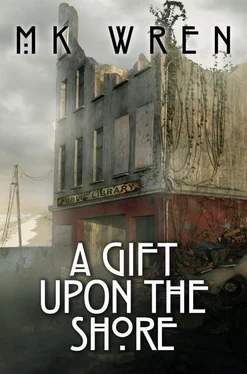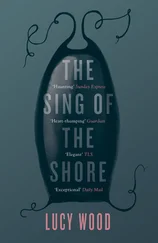She was alive and conscious, terrified by Shadow’s barking and perhaps by me. I quieted Shadow, then leaned over Miriam, and she looked back at me with fevered, fearful eyes. I knew she didn’t recognize me even before she spoke, the words forced as if she weren’t sure how to form them. “Who are you?”
I said, “I’m Mary Hope.”
That meant nothing to her. She only stared at me until I asked, “Do you know who you are?”
She shook her head, grimacing. “No. I… don’t know.”
That was the way she committed suicide.
She couldn’t kill her body, but she killed the self within her whose memories she couldn’t tolerate.
But the self-death of amnesia might be transitory. To me, she was still Miriam, the priestess of the irrational, maniacally bent on murder—on my murder, on the murder of the past, on the murder of the future.
No one else at Amarna knew she was still alive. And she wouldn’t be alive much longer if I left her here. Her eyes closed, and I couldn’t see any sign of breath. I pressed my fingers under the curve of her jaw and finally found a faint pulse.
“Come on, Shadow.” And I turned away, walked back to Amarna.
Jeremiah was in the barn. I told him where to find Miriam.
Bernadette performed the surgery on the dining-room table with opium for an anesthetic, and if I had been seeking revenge, I’d have had it in the next few weeks. But I took no pleasure in Miriam’s pain, not the pain of recovery, nor the agonies she must have endured during those six days she was lost in the wilderness of forest and despair.
We told her only that her name was Miriam. No more. The family agreed with me on that, although it’s hard for the younger children to accept. But it has been impressed on them that they are not to say anything to remind Miriam of the past. She has been born again, and like a child she is being taught to be a human being.
Jeremiah watches Miriam and Esther as they walk toward the house. He turns away, stares at Isaac’s grave, and the twin griefs haunt his eyes.
“I wonder if she’ll ever remember, Mary.”
“She might. I hope not.”
“For her sake, yes.”
I don’t add, for our sakes, for the sake of the children . I look down at the book in his hand. “Read to me, Jeremiah. Your eyes are better than mine.”
He smiles. “But I can’t read as well.”
“Yes, you can. Please.”
He opens the book, turns a few pages, then, pronouncing every word carefully, reads:
“‘The Poets light but Lamps—
Themselves—go out—
The Wicks they stimulate—
If vital Light
Inhere as do the Suns—
Each Age a Lens
Disseminating their
Circumference—’”
Vital light. Ancient light. I think of Miriam and the well of darkness hidden in the depths of her memory. I think of the survivalists Luke found in the Siskyou Mountains, and they are a tide of darkness. And if their children survive, their darkness will flow deeper, generation unto generation, and ultimately it could quench our light. And other survivors may one day discover Amarna, unknown factors of light or darkness.
I look toward the Knob, and I can only see a corner of the vault through the fruit trees. I can do no more to keep our light burning. All that’s left me is hope, and that’s all Rachel and I had to begin with.
Jeremiah is still poring over the book, frowning with concentration as he reads to himself. I don’t disturb him. I think of the reclusive Emily reaching across an ivy-covered stone wall more than a century and a half thick to cast wildflowers in his path.
Then I raise one hand to shade my eyes. Stephen is coming up from the house. He walks with long strides, and I think he’s grown half a foot this summer. Shadow rouses, runs to meet him, and he leans down to pet her. When they reach us, Jeremiah smiles and says, “Good day, Stephen. I suppose you’ve been hiding with a book somewhere.”
“Well, I have to when my teacher gives me so much to read.”
I laugh at that. “I hope you’re not expecting sympathy from your teacher. But I’m glad you’re here. Would you like to take a walk on the beach with me?”
He nods. “I was about to ask you that.”
Jeremiah rises, and he and Stephen lift me to my feet. Jeremiah has my cane ready. I say, “Thank you, gentlemen.” They laugh at that word, no doubt taking it literally, and that’s apt enough.
Stephen and I walk to the house, where I make a short detour to my room, then we start down the beach path. Jonathan, Little Mary, Deborah, and Rachel join us, and when we reach the beach, they spill laughing and shouting onto the sand, with Shadow running joyfully around them. The sea is the quiet, glossy sea of summer, the sand pale and drifted like snow. Stephen shortens his stride to match my slow pace as we walk along in the firm, damp sand at the water’s edge.
Finally, I stop, turn to face him, and take a small, black portfolio out of my pocket. I offer it to him.
“I have some more reading for you. I finished it last night, Stephen. The Chronicle of Rachel.”
For a moment he only stares at the portfolio, then he takes it from me. “It’s… finished?”
“Yes.”
He opens it carefully, reads aloud from the first sheet, “‘And it came to pass in the days before the End of the last civilization, that Mary Hope left the city to come to the sea, and there she found at a place called Amarna a woman of wisdom and courage, and her name was Rachel Morrow….’” He smiles, looks up at me. “I think now when I read this, I’ll… understand.”
“I know you will. You proved that.” I look into his face, seeking the vanishing contours of childhood. “Stephen, there’ll be so much for you to understand, and so many things will happen to you in your lifetime that will call for wisdom and courage. And I won’t be here to help you, just as the day came when Rachel wasn’t here to help me. In a way I grieve for you. It took me a long time to realize that Rachel grieved for me when she knew she was dying.”
He frowns, and I know he doesn’t like to talk about my dying. But he’s learned a lot about death this thirteenth year of his life. And about wisdom and courage. Finally he says, “I wish I’d known Rachel.”
I look out at the sea, chatoyant aquamarine, the surf casting up white laces of foam. “You know her, Stephen. And so will your children, generation unto generation. Even when her name is forgotten, they’ll know her.”
And I close my eyes to listen. I am here… I am always here ….
M. K. WREN, a widely acclaimed writer and painter, was born in Texas, the daughter of a geologist and a special education teacher. Twenty-five years ago she moved to the Pacific Northwest, where she wrote Curiosity Didn’t Kill the Cat; A Multitude of Sins; Oh, Bury Me Not; Nothing’s Certain But Death; Seasons of Death; Wake Up, Darlin’ Core y; and the science-fiction trilogy, The Phoenix Legacy . As an artist, Ms. Wren has worked primarily in oil and transparent watercolor and has exhibited in numerous galleries and juried shows in Texas, Oklahoma, and the Northwest.
The Phoenix Legacy

Sword of the Lamb (Book One of the Phoenix Legacy)

Shadow of the Swan (Book Two of the Phoenix Legacy)

House of the Wolf (Book Three of the Phoenix Legacy)
Connect with Diversion Books
Читать дальше















